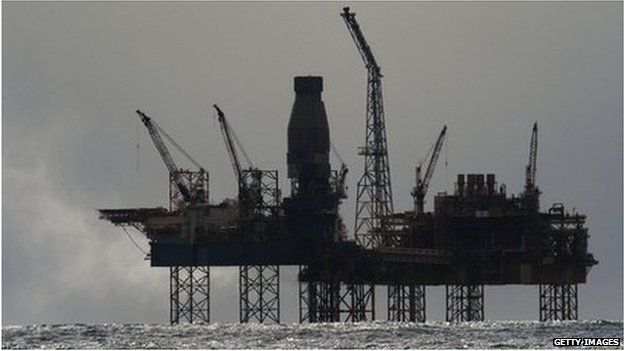How important is North Sea oil and gas to the UK economy?
- Published

Global oil prices have fallen sharply over the past seven months, leading to a crisis for many producers.
Earlier this week, the price of a barrel of Brent crude dipped below $50 a barrel for the first time since May 2009.
Oil giant BP has announced it is to cut 200 jobs and 100 contractor roles following a review of its North Sea operations.
BP is the just the latest in a string of North Sea operators to announce job losses. It said it needed to respond to "toughening market conditions".
But consumers are likely to have to pay less to drive their cars and heat their homes.
So how important is the oil and gas industry to to the UK?
What is the oil industry worth to the UK economy?
A report for the industry body Oil and Gas UK last year estimated the sector is worth about £35bn to the UK economy.
In 2012-13 the industry paid £6.5bn in taxes to the UK government.
Last year, investment of £14.4 billion was made in the industry on new projects and exploration, which was said to be the highest for 30 years.
Oil and Gas UK said there are more than 3,000 companies directly involved in the industry.
The sector employs 450,000 across the UK. The average salary in 2012 was £64,000 a year.
Oil and Gas UK said 330,000 other jobs are directly sustained by the industry with 207,000 people within the wider supply chain and a further 100,000 jobs supported by the economic activity created by employees' spending.
- 45% of jobs are based in Scotland
- 21% are in south east England
- 6% in north west England, 5% in the West Midlands
- 5% in eastern England
Source: Oil and Gas UK
Who are the big players in the North Sea? Are they cutting back?
- Shell said it employs about 4,500 staff and core contractors in Scotland, and has about 1,000 additional contractor positions. Shell UK announced it was cutting 250 jobs in August.
- BP currently employs 3,500 people in the North Sea, with a further 11,000 elsewhere in the UK.
- Apache entered the North Sea in 2003 when they acquired the Forties field from BP. They imposed a 10% reduction on its contractors' wages from 1 January.
- ConocoPhillips, the US based giant has 1,650 jobs in the UK
- Chevron UK has a turnover of £1.17bn. It announced last July it was cutting 225 jobs and cutting contractor rates.
Why is the price of oil falling?
From 2010 until mid-2014, world oil prices had been fairly stable, at around $110 a barrel, but since June prices have more than halved.
Economists say the falling price is down to supply and demand: as economies slow down across the world there is not enough demand for what is being produced.
Booming production in the US, and particularly the shale gas revolution, has also contributed to the recent oil price fall.
There is a continuing move away from oil to other energy sources.
In some countries extracting oil remains relatively cheap but drilling in deep water wells such as those in the North Sea remains expensive, meaning the fall in prices has an immediate impact on companies.
This is good for consumers as it potentially means cheaper fuel at the pumps, but has a negative impact on the UK's oil and gas industry.
What is the future of the industry?
In 2013 the UK government commissioned Sir Ian Wood to carry out a review of the industry, the first such commission in 20 years.
His final report, released on 24 February 2014, made a series of recommendations, including the setting up of a new independent regulator.
He also recommended more investment in infrastructure to improve efficiency, and more money to be spent on exploration and exploitation of untapped reserves.
The review said this would put the UK in a much stronger position to exploit the estimated 25 billion barrels of oil remaining in the North Sea.
The Wood report claimed changes in the way the North Sea oil and gas sector operates could produce at least three to four billion additional barrels of oil over the next 20 years, but with oil prices low, industry bodies want to see taxes reduced to save investment and jobs.
At the start of this week, Malcolm Webb, chief executive of Oil and Gas UK, said "a significant amount" of UK oil and gas production was becoming unprofitable at current prices.
The Scottish government has also been calling for taxes to be reduced and accused UK government ministers of "mismanagement" of North Sea oil.
The government rejects this accusation, and says it is doing everything it can to protect jobs. Energy Secretary Ed Davey has hinted that the industry's tax regime could be re-examined.
Oil workers are said to be concerned about the uncertainty in the sector. The main reason for hesitancy or lack of confidence was falling prices having an indirect impact on jobs.
Who regulates the industry?
An independent regulator, the Oil and Gas Authority, is being set up after the Wood Review said the existing one was "no longer adequate" to meet the challenges of managing an "increasingly complex" sector.
The industry is being asked for its view on the scope of the new regulator and what powers and sanctions it should have.
Andy Samuel has been appointed as the chief executive and said he knows "first-hand the challenges industry currently faces".
The first task for the regulator is to work with the UK government on a "wholesale review" of the tax regime for the sector, including "everything from tax rates to tax allowances".
Industry bodies want to see taxes reduced to save investment and jobs.
- Published15 January 2015
- Published15 January 2015
- Published15 January 2015
- Published19 January 2015
- Published10 January 2015